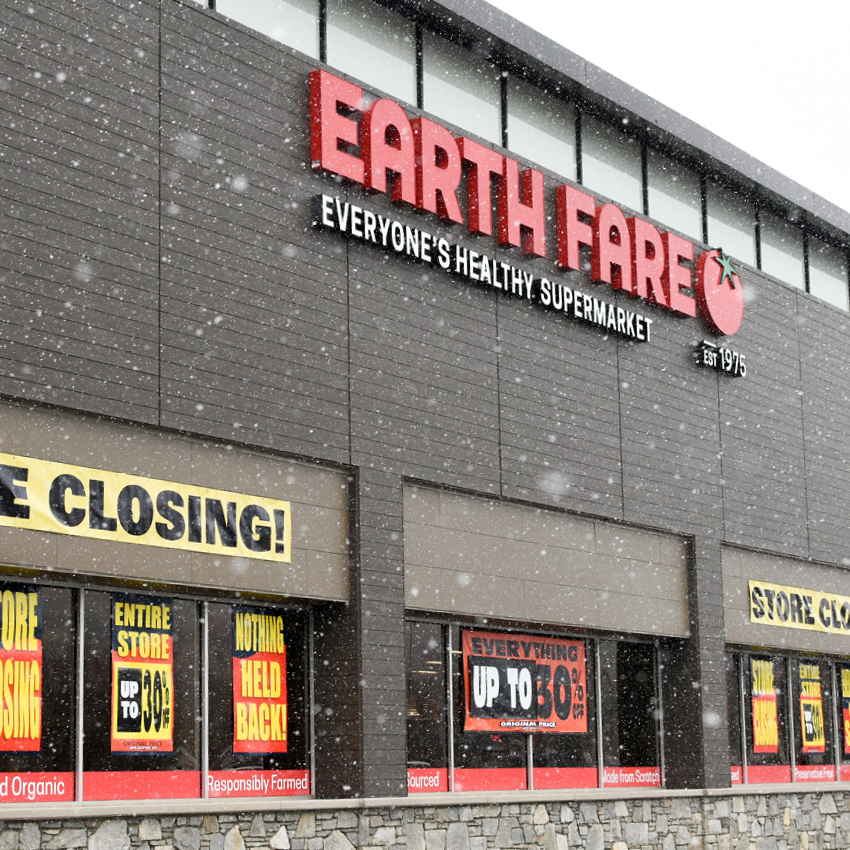Earth Fare, the chain of 50 natural and organic supermarkets, is as good as gone. The company has filed for Chapter 11 and announced that it will liquidate all store inventory and fixtures and close each store as it empties out of product. It will also shutter its corporate headquarters in Asheville, N.C.
What happened? Earth Fare represents just the latest chain of healthy-eating supermarkets that are in trouble or failing. In fact, there\’s an epidemic of supermarkets in the healthy eating sector that are struggling or failing including Lucky\’s Market, Fairway Markets and Sprouts.
Why? Let\’s take a closer look at the backstory of what\’s happening with Earth Fare as the poster child.
Elusive Capital
Earth Fare has a pretty typical food store background. It started in 1975 as a retailer of bulk foods, then grew up to become a full-service supermarket. More recently, it expanded its store fleet to 10 states in the South and Midwest.
Earth Fare obtained enough capital to expand several years ago by selling a majority stake to Oak Hill Capital Partners. As recently as last year, Earth Fare said it would continue to build out stores by another 50 locations in five years. Unfortunately for Earth Fare, a pretty good story needs to be presented to investors to convince them to refinance debt and keep the engines of expansion running.
Natural and organic product is no longer the domain of specialty stores; it’s a commodity.
That story is increasingly difficult to tell convincingly when it comes to natural and organic retailing. Here\’s why: Earth Fare\’s tagline is, \”Everyone\’s Healthy Supermarket.\” In reality, the opposite is what\’s happening now: \”Everyone Has a Healthy Supermarket.\” Natural and organic product is no longer the domain of specialty stores; it\’s a commodity. Whole Foods was the first game-changer, then just about every other supermarket under the sun took on the natural foods mantra, which is now completely mainstreamed by Amazon.
So, Earth Fare fell from its differentiated niche and found itself stuck with a lot of stores thinly spread across the landscape that consumers just didn\’t need anymore. Earth Fare confessed in a statement: \”Continued challenges in the retail industry impeded the company\’s progress as well as its ability to refinance debt [and so it is] not in a financial position to operate on a go-forward basis.\”
And so, that was that.
Unlucky Kroger
Lucky\’s Market presents a similar dynamic. It was founded in Colorado in 2003 specifically to enter natural and organic food retailing to compete with Whole Foods. In 2016 it gained new capital for expansion because of a majority ownership position taken by Kroger. So, Kroger became an investment banker of sorts with a view toward using Lucky\’s as a means to expand into Florida, where it was unrepresented. Eventually, it grew to 39 Lucky\’s stores in 10 states, 11 of which were in Florida.
Lucky\’s proved to be a luckless venture for Kroger. Lucky\’s has filed for bankruptcy and all locations will be sold or closed. Kroger will take a write-down of about $200 million because of that investment in addition to earlier-incurred operational losses. So, the same headwinds faced by Earth Fare blew away Lucky\’s.
Unfair way and Sprouts
In much the same fashion, Fairway Markets, the produce-centric supermarket in New York, took on too much debt, expanded too much and is now closing down stores and possibly selling remaining locations.
Then, there\’s the saga of Sprouts, the fresh-focused chain of 340 stores based in Arizona. The Sprouts\’ challenge is that it lacks density. It has stores from California to Louisiana to New Jersey to Florida, and a lot of territory in between.
Its lack of density presents management and supply challenges that are exacerbated by a fairly high debt load, plus the other challenges facing all natural-food retailers, as earlier cited. Sprouts is endeavoring to meet its challenges by toning down new store development and moving to a smaller format.
Collateral Damage
Sometimes when considering big trends, it\’s easy to lose sight of the collateral damage caused as companies fade or go out of business.
In this instance, one wholesale grocer is going to take a big hit because it happened to supply product to Earth Fare, Lucky\’s and Fairway. That wholesaler is UNFI, based in Rhode Island. According to Barclays, the winding down of those chains will cost UNFI 2.4 percent of its sales, or about $270 million. Additionally, the three retailers have many million dollars in unpaid bills due the wholesaler that will have to be resolved.
As for human costs, thousands of jobs will be lost at the retailers themselves, perhaps more at the wholesaler and even more at many vendors to the chains.
Also, here\’s one curious fact: Jack Murphy, who was CEO of Earth Fare, left there in 2014 to become CEO of Fairway for the next three years. Seems like an odd coincidence of poor management,
There are a lot of backstories associated with lack of vision and leadership. As for what the decline in natural-food retailing means for all retailers, it reveals that if consumers are drifting away from your marketing position, it\’s time to take action. This is what broad-lines retailers from Macy\’s to Target are doing as they leave obsolete shopping malls to open smaller stores nearer to their customers with the strategy of becoming endearing neighborhood community centers.




